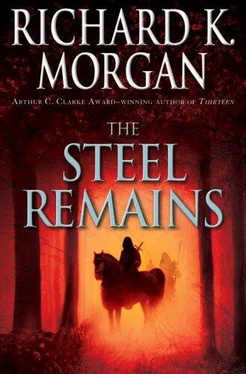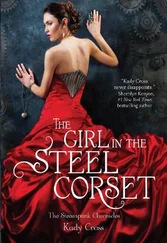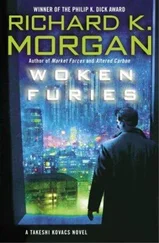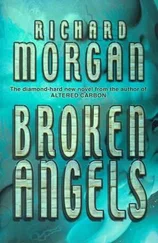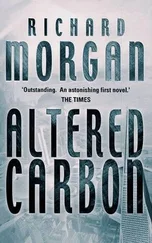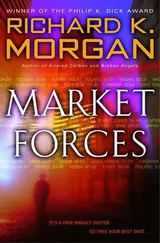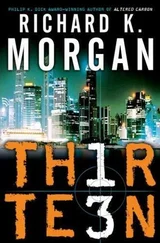THE STEEL REMAINS
Richard K. Morgan
This book is for my father,
John Morgan,
for carrying me past the seaweed.
“I think you look on death as your friend,” she murmured. “That is a strange friend for a young man to have.”
“The only faithful friend in this world,” he said bitterly. “Death is always sure to be at your side.”
—Poul Anderson,
The Broken Sword
When a man you know to be of sound mind tells you his recently deceased mother has just tried to climb in his bedroom window and eat him, you only have two basic options. You can smell his breath, take his pulse, and check his pupils to see if he’s ingested anything nasty, or you can believe him. Ringil had already tried the first course of action with Bashka the Schoolmaster and to no avail, so he put down his pint with an elaborate sigh and went to get his broadsword.
“Not this again,” he was heard to mutter as he pushed through into the residents’ bar.
A yard and a half of tempered Kiriath steel, Ringil’s broadsword hung above the fireplace in a scabbard woven from alloys that men had no names for, though any Kiriath child could have identified them from age five upward. The sword itself also had a name in the Kiriath tongue, as did all Kiriath-forged weapons, but it was an ornate title that lost a lot in translation. “Welcomed in the Home of Ravens and Other Scavengers in the Wake of Warriors” was about as close as Archeth had been able to render it, so Ringil had settled on calling it the Ravensfriend. He didn’t like the name especially, but it had the sort of ring people expected of a famous sword—and his landlord, a shrewd man with money and the potential for making it, had renamed the inn the same way, setting an eternal seal on the thing. A local artist had painted a passable image of Ringil wielding the Ravensfriend at Gallows Gap and now it hung outside for all the passing world to see. In return, Ringil got bed and board and the opportunity to sell tales of his exploits to tourists in the residents’ bar for whatever was dropped into his cap.
All that, Ringil once remarked ironically in a letter to Archeth, and a blind eye turned to certain bedroom practices that would doubtless earn Yours Truly a slow death by impaling in Trelayne or Yhelteth. Heroic status in Gallows Water, it seems, includes a special dispensation not available to the average citizen in these righteous times. Plus, he supposed, you don’t go queer baiting when your quarry has a reputation for rendering trained swordsmen into dogmeat at the drop of a gauntlet. Fame, Ringil scribbled, has its uses after all.
Mounting the sword over the fireplace had been a nice touch, and also the landlord’s idea. The man was now trying to persuade his resident celebrity to offer dueling lessons out back in the stable yards. Cross blades with the hero of Gallows Gap for three Empire-minted elementals the half hour. Ringil didn’t know if he felt that hard up yet. He’d seen what teaching had done to Bashka.
Anyway, he dragged the Ravensfriend from the scabbard with a single grating clang, slung it casually over his shoulder, and walked out into the street, ignoring the stares from the audience he had been regaling with tales of valor about an hour ago. He guessed they’d follow him at least part of the way to the schoolmaster’s house. It couldn’t do any harm, if his suspicions about what was going on were correct, but they’d probably all cut and run at the first sign of trouble. You couldn’t blame them really. They were peasants and merchants, and they had no bond with him. About a third of them he’d never even seen before tonight.
Introductory comment from the treatise on skirmish warfare that the Trelayne Military Academy had politely declined to publish under his name: If you don’t know the men at your back by name, don’t be surprised if they won’t follow you into battle. On the other hand, don’t be surprised if they will, either, because there are countless other factors you must take into account. Leadership is a slippery commodity, not easily manufactured or understood. It was simple truth, as gleaned in the bloody forefront of some of the nastiest fighting the free cities had seen in living memory. It was, however, the Lieutenant Editor in Trelayne had written kindly, just too vague for the Academy to consider as viable training material. It is this ambivalence as much as any other that leads us to decline your submission. Ringil looked at that last sentence on the parchment and suspected a kindred spirit.
It was cold out in the street. Above the waist he wore only a leather jerkin with loose half-length sailcloth sleeves, and there was an unseasonal early chill sloping down the spine of the country from the Majak uplands. The peaks of the mountains that the town nestled under were already capped with snow, and it was reckoned that Gallows Gap would be impassable before Padrow’s Eve. People were talking again about an Aldrain winter. There had been stories circulating for weeks now, of high-pasture livestock taken by wolves and other, less natural predators, of chilling encounters and sightings in the mountain passes. Not all of them could be put down to fanciful talk. This, Ringil suspected, was going to be the source of the problem. Bashka the Schoolmaster’s cottage was at the end of one of the town’s cross streets and backed onto the local graveyard. As by far the most educated man in the tiny township of Gallows Water—its resident hero excluded—Bashka had been handed the role of temple officiator by default, and the house went with the priest’s robes. And in bad weather, graveyards were a fine source of meat for scavengers.
You will be a great hero, a Yhelteth fortune-teller had once read in Ringil’s spittle. You will carry many battles and best many foes.
Nothing about being a municipal exterminator in a border-town settlement not much bigger than one of Trelayne’s estuary slums.
There were torches fixed in brackets along the main streets and river frontage of Gallows Water but the rest of the town must make do with bandlight, of which there wasn’t much on a night this clouded. True to Ringil’s expectations, the crowd thinned out as soon as he stepped onto an unlit thoroughfare. When it became apparent where he was headed specifically, his escort dropped by more than half. He reached the corner of Bashka’s street still trailing a loose group of about six or eight, but by the time he drew level with the schoolmaster’s cottage—the door still gaping open, the way its owner had left it when he fled in his nightshirt—he was alone. He cocked his head back to where the rubberneckers hovered at the far end of the street. A wry grin twitched his lips.
“Stand well back now,” he called.
From among the graves, something uttered a low droning cry. Ringil’s skin goosefleshed with the sound of it. He unshipped the Ravensfriend from his shoulder and, holding it warily before him, stepped around the corner of the little house.
The rows of graves marched up the hill where the town petered out against outcroppings of mountain granite. Most of the markers were simple slabs hewn from the self-same stone as the mountain, reflecting the locals’ phlegmatic attitude to the business of dying. But here and there could be seen the more ornately carved structure of a Yhelteth tomb, or one of the cairns the northerners buried their dead under, hung with shamanistic iron talismans and daubed in the colors of the deceased’s clan ancestry. As a rule, Ringil tried not to come out here too often; he remembered too many of the names on the stones, could put faces to too many of the foreign-sounding dead. It was a mixed bag that had died under his command at Gallows Gap that sweltering summer afternoon nine years ago, and few of the outlanders had family with the money to bring their sons home for burial. The cemeteries up and down this stretch of the mountains were littered with their lonely testimony.
Читать дальше
